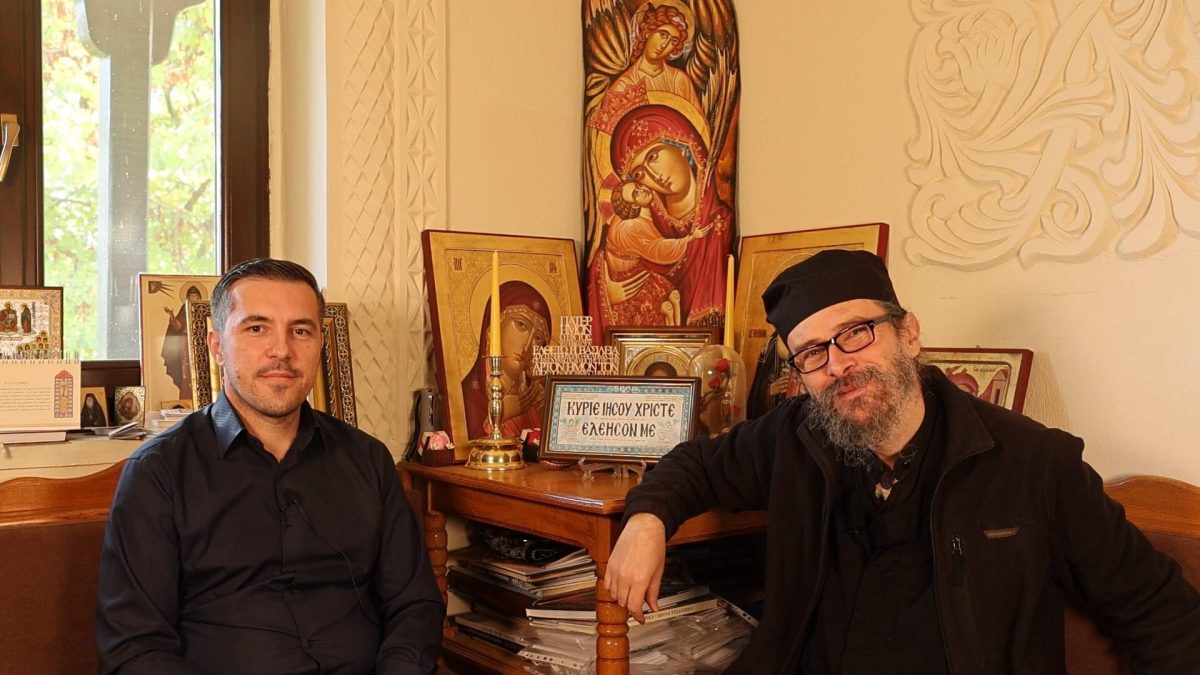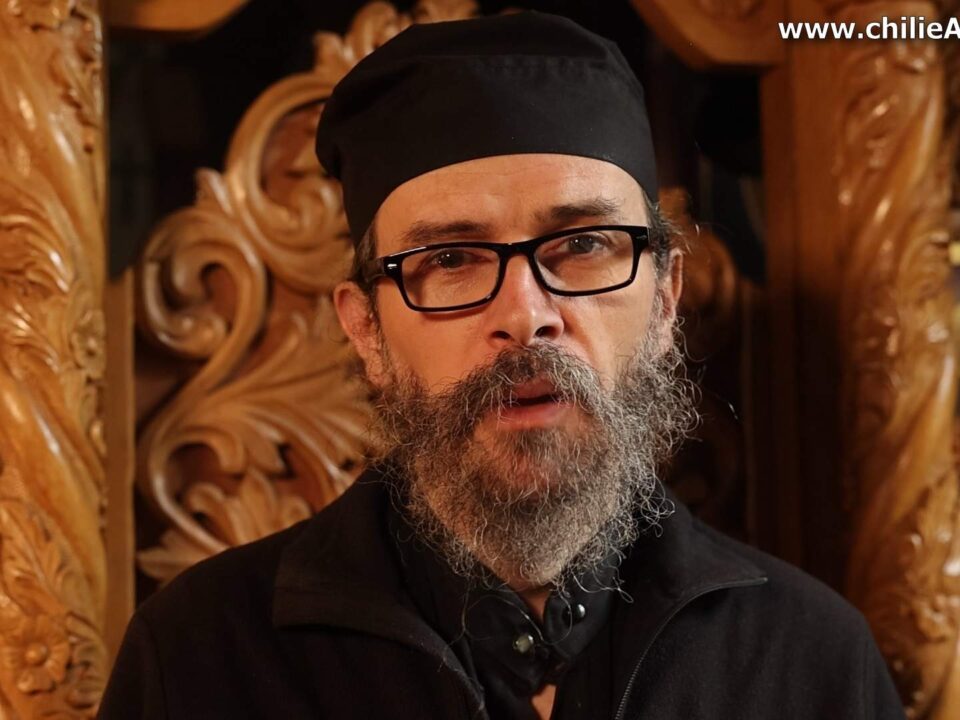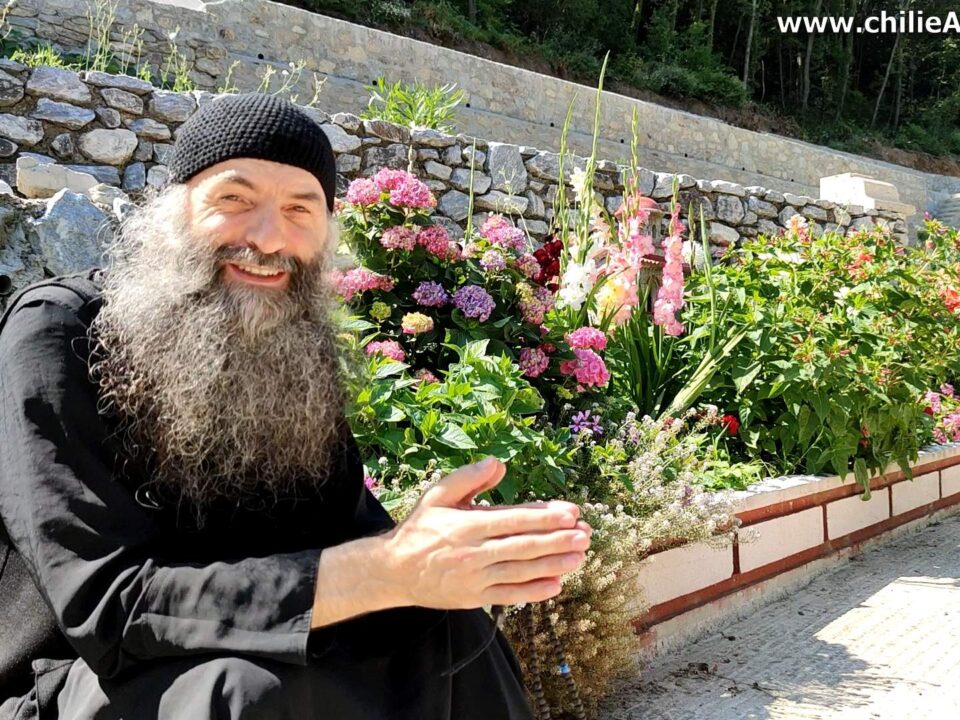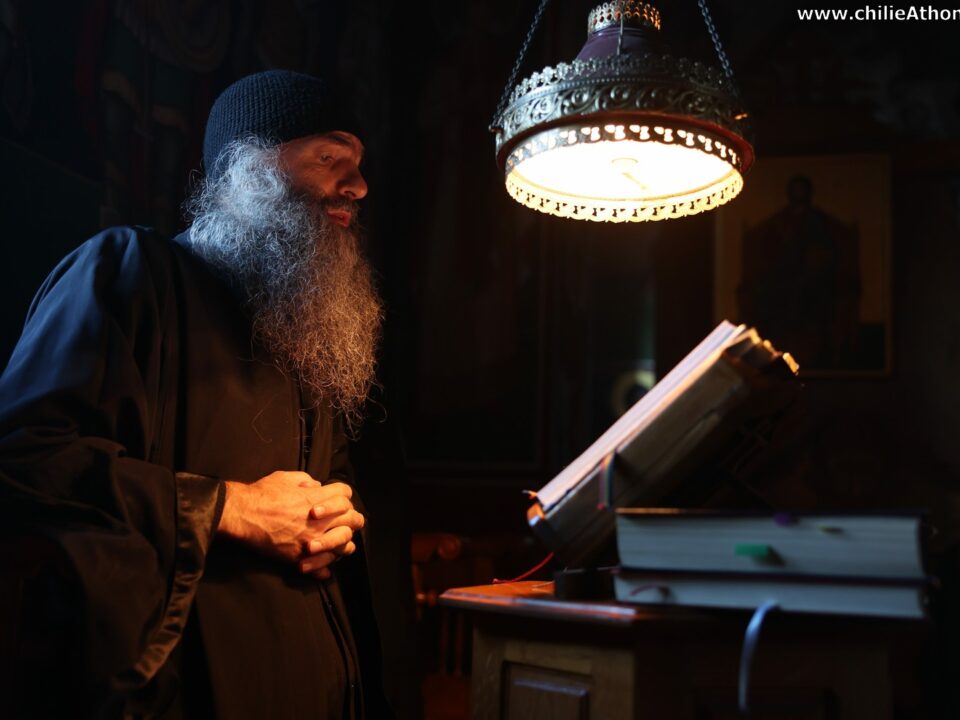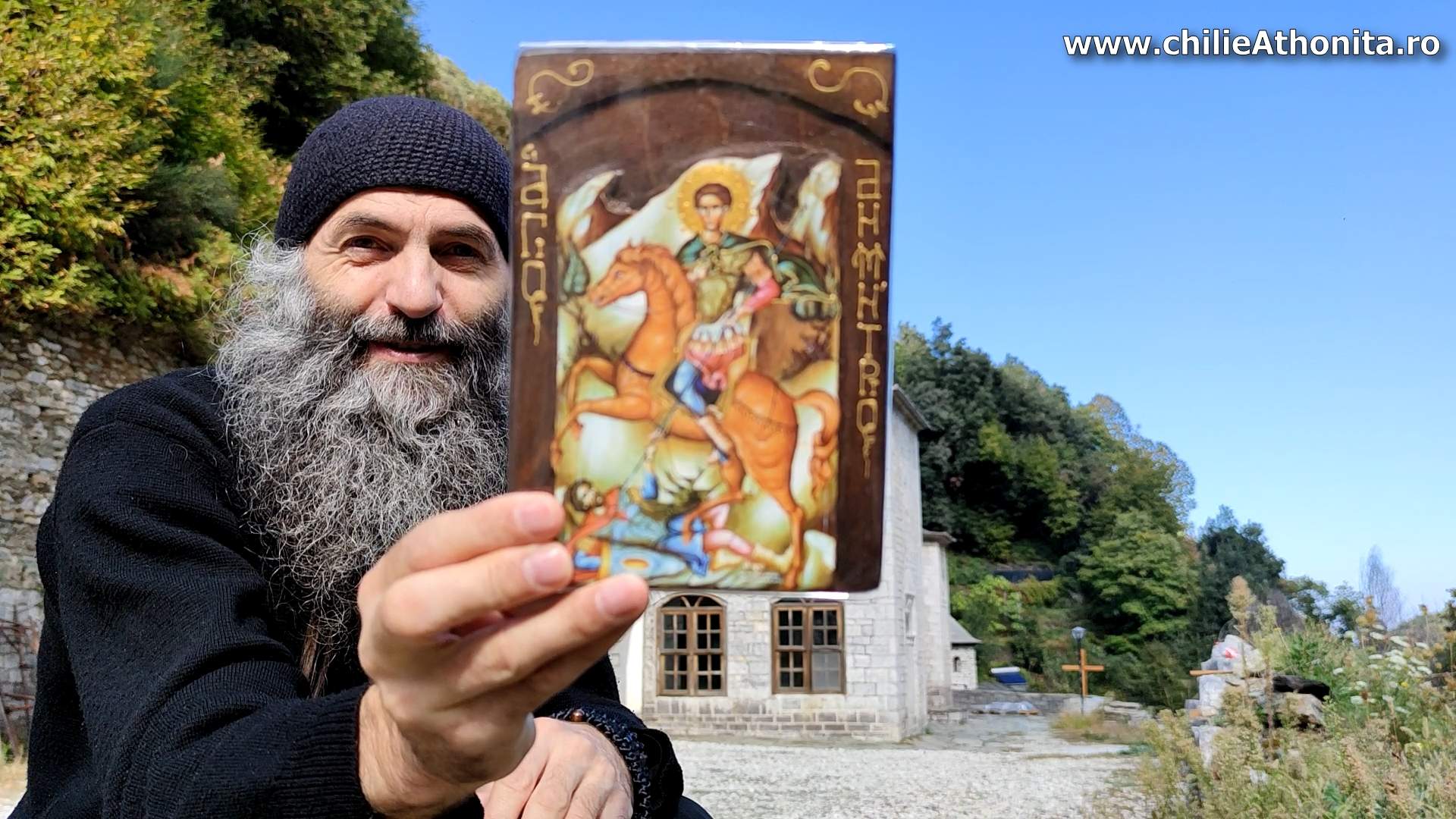
Saint Demetrius: Life, Miracles – Father Pimen Vlad
20 October 2022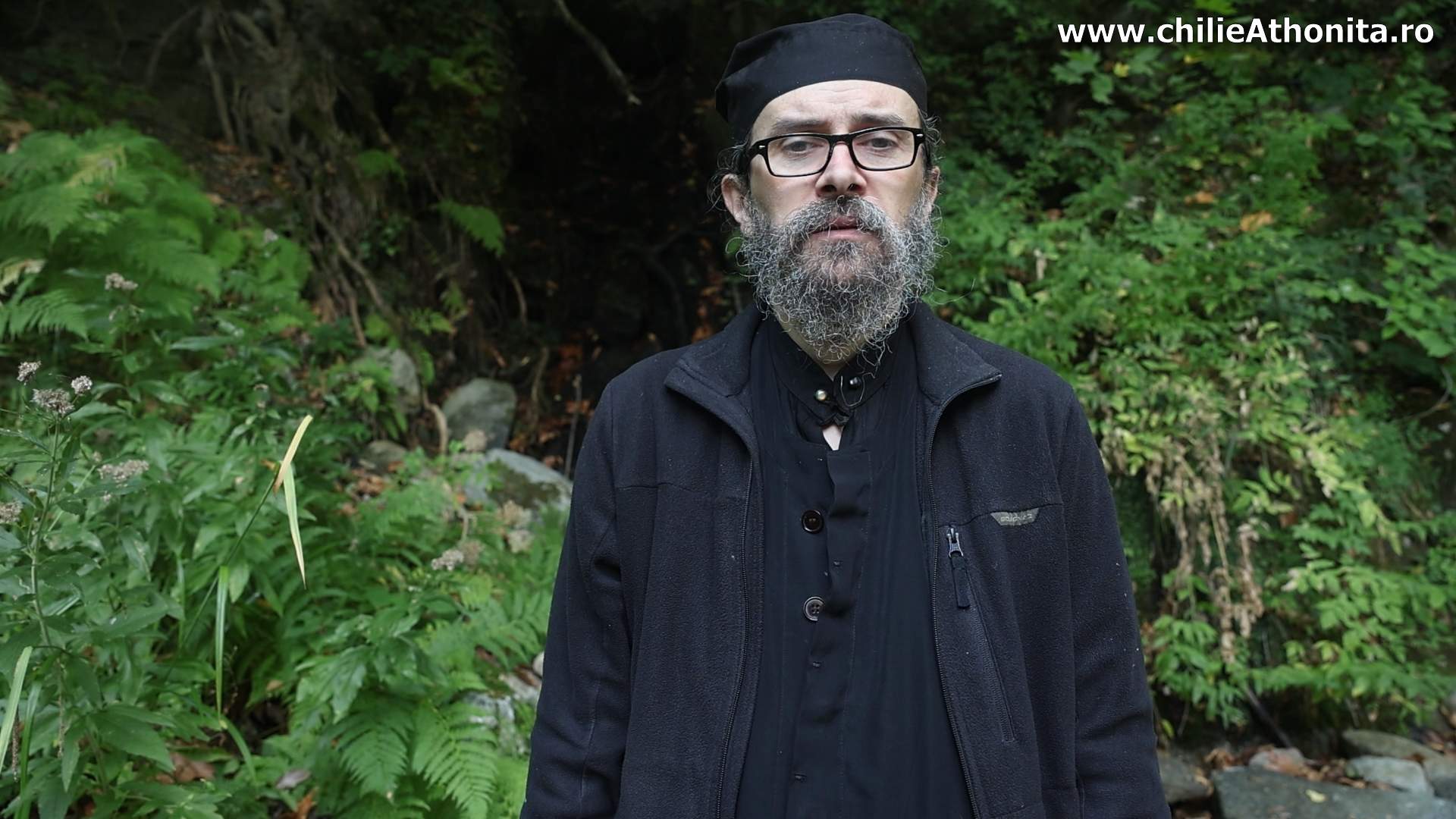
How and Why We Cry – Father Theologos
25 October 2022Watch a surprising interview with the deputy secretary general of the Romanian Senate, Mr. Ciprian Bucur. As monks, we are not interested in left and right wing politics, partial politics, party politics, but in the politics of Christ – in the love of God and nation. We reckon you’ll be in for a pleasant surprise here.
In this interview we hope you will gain the hope to nevertheless keep going, and to not judge everyone the same. Every man is judged by God according to the love he has for Him and for his fellow men.
Enjoy!
Glory to the Father, and to the Son, and to the Holy Spirit, now and forever and unto the ages and ages. Amen. Through the prayers of our Holy Fathers, Lord Jesus Christ, Son of God, have mercy on us! Amen.
Father Theologos: Dear friends, we are here with Ciprian Bucur who is the Deputy Secretary General of the Romanian Senate, right? The senate. I don’t know much about politics, I’m a monk but I know a little about people and I’ve loved Ciprian for a long time since we met.
I know him as a man, I don’t know him as a politician and that’s why I asked him to do a podcast, a spiritual podcast. We’re not going to talk a lot about politics, as I said I don’t even know if he’s part of a party or what party he’s part of, but I’d like him to share a little bit of his spiritual experience and, of course, his expertise as a politician, if you will, and as a man who is is around, has expertise in these areas.
And the first question, Ciprian, is – the Holy Mountain – you’ve been coming to the Holy Mountain for a very long time, what made you come and how…?
Ciprian Bucur: Hello and I’m excited to be doing this podcast. I didn’t wish for it, but this is how things turned out.
Father Theologos: That’s the way things came together.
Ciprian Bucur: Yes… Indeed, I have been coming to the Holy Mountain for a long time. Evidently guided and brought along by a friend. Admittedly, I didn’t know much about the Holy Mountain, or, at most, I knew bits and pieces that distorted a bit from what I would have liked to find. But what I found real in the Holy Mountain goes beyond anything I thought would be here. What brought me here? I think it was primarily the desire and need for knowledge that brought me. Knowing more about the spiritual approach than I knew before.
Things happened beyond my capacity to understand things; after the first experience in the Holy Mountain I left in a daze, I didn’t really know (what was going on) I was in such a halo effect. On the way home, the feelings settled and I realized that I had experienced a special moment in every way. I wanted to come back and I kept coming back and I think I’ll keep coming back for as many days as I have.
Father Theologos: Amen! May the good God help us! A miracle, a wonderful event, a presence of God in your life?
Ciprian Bucur: One notable one… There were several, but the palpable one or the first one was right after the first visit. Usually, I don’t ask God for anything, I thank Him for what I have, but there was one piece missing from my puzzle at the time I came to the Holy Mountain: a child. I asked the Mother of God, if I am worthy, to bless me with a child. The baby came immediately.
Father Theologos: Glory to the Lord!
Ciprian Bucur: Immediately the baby came!
Father Theologos: I know you’ve been trying for I don’t know how long, right?
Ciprian Bucur: Yes. We wanted it, [we got] a little girl, obviously named Maria.
Father Theologos: Maria. How nice! Glory to the Lord!
Ciprian Bucur: It was a miracle for which I am not worthy to thank the Mother of God. I mean it was overwhelming in every way.
Father Theologos: And I think beyond that miracle, I think the Holy Mountain works very intensely on you and on anyone… on you and on your family.
Ciprian Bucur: Obviously. With what I leave with from the Holy Mountain I am able to direct my life in terms of both professional and family activities. I am able to guide myself. It’s a landmark.
Father Theologos: Yeah, it’s a landmark. Do you think other politicians should come or how do you see…?
Ciprian Bucur: I think that everyone is called at some point, the important thing is to want to, but to be able to decide things well, especially when you are a high public official, a decision-maker in the Romanian state, to go through the Holy Mountain can mean a peace of mind that no one else gives you. Because in public office, there are a lot of concerns, and they are great and aggressive sometimes.
What the Holy Mountain lays on the soul of every passer-by here can benefit everyone. And yes, I urge [people to come], obviously. I urge everyone, all men who feel attracted by the Holy Spirit, by the Mother of God, by Christ, I urge them with all my being to come…
Father Theologos: So, however, the office of a dignitary is merged with the Holy Mountain because there appears such a…, how shall I say, people say “What is a politician looking for or what is a dignitary looking for?” But I guess it goes together because it provides a certain peace, right?
Ciprian Bucur: There are two plans: the experiences you have in the Holy Mountain set your life, your personal life on a normal path and it also fulfills your professional life because there are moments when you need a light, you need something to tell you which is the way.
Father Theologos: Yes, yes. And then the Holy Mountain fulfills you as a person, as a public person…
Ciprian Bucur: [That’s] on the one hand, and on the other hand, as a professional, it helps you to make the best decision in delicate moments.
Father Theologos: Yes, yes, yes. Glory to the Lord! Extraordinary. I have some questions here, on my laptop… Yes, in relation to the Church, how do you see the relationship between the Church and the State, as a politician and as someone, well, with an important position?
Ciprian Bucur: There should be a relationship and I hope it will be an interdependent relationship. Each of the two institutions, not to call them powers, should support each other. It happens. Not entirely, but it happens. The Romanian state supports the Church. It also supports the other cults, 18 recognized cults, but it mostly supports the Romanian Orthodox Church.
Father Theologos: Because most Romanian citizens are Orthodox.
Ciprian Bucur: Yes, 80-something percent of Romanian citizens are Orthodox. No public policy that affects the Church is made without discussion with the Church. That is, no public approach, no legislative or public policy or economic approach is made if that public policy is not discussed with representatives of the Orthodox Church.
Father Theologos: That’s very good…
Ciprian Bucur: And there is a convergence somewhat in that sense.
Father Theologos: Yes, because it is very difficult for the Church to claim political expertise, but it is also very difficult for politicians to claim ecclesiastical expertise…
Ciprian Bucur: Of course, obviously.
Father Theologos: I think, I remember a while ago, there was this trend against the Church -”We want hospitals, we don’t want cathedrals” – and now I think it’s exactly the opposite. What determined this…?
Ciprian Bucur: How beautifully God turns paradigms and things around…! Well, the context, the need, the situations turned the pyramid upside down.
Father Theologos: Yes. I believe that the Church is par excellence the hospital…
Ciprian Bucur: Unequivocally. They say if you pass by the church, you don’t get to the hospital.
Father Theologos: Exactly.
Ciprian Bucur: And I believe that. I mean, it’s an established fact.
Father Theologos: Proven, yes.
Ciprian Bucur: Proven.
Father Theologos: Glory to the Lord! From the Holy Mountain, Romania is seen as an oasis of stability. I’m not saying things couldn’t be better. They could be better, but it is clear that relative to other countries in the world, so to speak, generally speaking, Romania is an oasis of stability. Do you have that as your goal? Are you fighting for this? What is happening?
Ciprian Bucur: Father, things are complicated, they are convulsive in general, and not only in this space where we are, but worldwide.
Father Theologos: Worldwide, right.
Ciprian Bucur: There are asymmetrical things that happen and sometimes we are actors, sometimes we are spectators. From this point of view, Romania is still a factor of stability. Maybe this relationship with the Church also helps…
Father Theologos: That’s what I’m thinking too.
Ciprian Bucur: …the effectiveness of this principle and this situation actually because things in Romania are relatively stable at the moment.
Father Theologos: Yes, yes. Because I see, that’s what worries me a lot, and what worries me the most is the appearance of arguments between you. Because a nation cannot be defeated, but a nation can commit suicide. And I say between you – I don’t mean between you personally, but between you. It would be great if people could, if the political house could, for the sake of stability, for the sake of understanding, unite somewhat, of course each on his own position and maintain this stability so that people can be reassured.
Ciprian Bucur: Yes. This is happening in Romania now. I mean things are on the template you mentioned. There is political stability, a stability that provides the prerequisites for a correct state approach in the coming period, given, once again I say, the rather convulsive context.
Father Theologos: Exactly, it’s very convulsive…
Ciprian Bucur: Obviously, Romania is not separated from the European context, from the world context, there are crises, we have refugees, we have an economic crisis, an energy crisis in some areas, because Romania has the valence of being an independent energy state…
Father Theologos: Glory to the Lord!
Ciprian Bucur: This makes it independent and gives it a rather comfortable status.
Father Theologos: Yes, this is very important, very important that Romania is energy independent and this is a great achievement of yours, I mean, praise God, God bless you! Yes, and so people should be relatively calm. Of course prices will go up and up, but still I reckon it won’t be… I understand that in other countries there will be great drama this winter.
Ciprian Bucur: Yes. In Romania, things are stable for now. There has also been an increase in the share, in the price level, because I told you that we depend on a wider context, but I don’t think it will reach the level of other states. Now what the… God knows.
Father Theologos: Yes.
Ciprian Bucur: We’re under the cover of things done before and things done currently, of political decisions that were good and are now being seen.
Father Theologos: By the way, you told me of a miracle and truly may God bless Mary and your lady!
Ciprian Bucur: May God help us!
Father Theologos: Have you seen God’s presence in politics? An intervention in the affairs of the city, let’s not say a policy in the narrow sense, but in your daily life.
Ciprian Bucur: After all, the fact that… A miracle can also be a signature on an administrative document.
Father Theologos: Obviously.
Ciprian Bucur: And a signature on a law and an amendment to a law can be a miracle.
Father Theologos: Yeah, that’s what I mean…
Ciprian Bucur: There are many of these.
Father Theologos: Yes? Glory to the Lord! I don’t know because I don’t have contact…
Ciprian Bucur: Yes. Or opposing a bill that is unsupportable with arguments. Arguments may not come from your philosophy of life, they may come from divine providence.
Father Theologos: That’s right.
Ciprian Bucur: And then that can be interpreted horizontally, that vertically there are probably miracles that happen…
Father Theologos: By the way, on education, because I’m very interested in the problems of youth, how is the education of young people and what is the vision, so to speak, of the Senate or… What is the spirit…? And especially regarding problems of sin.
Ciprian Bucur: Technically, from a legislative point of view, we are in a national process of drafting a new package of laws on education. A new philosophy of education – more modern, adapted to today’s needs. But from a practical point of view, we know very well that things are not going in the right direction. Young people are besieged on all sides by all kinds of philosophies that are contrary to real and sustainable principles of life.
Father Theologos: Yes. [Principles which are not] Christian, let alone Orthodox.
Ciprian Bucur: Yes, I mean young people from Romania, and I’m thinking not only from Romania…
Father Theologos: That’s right…
Ciprian Bucur: They are besieged by all sorts of… philosophies contrary to principles… which distort them from the right path, unfortunately. And here you know what I mean.
Father Theologos: I know.
Ciprian Bucur: Social networks, context, I don’t know, intersocial relationships…
Father Theologos: But the problem of bodily, so to speak, sexual problems that are…
Ciprian Bucur: Yes, yes, yes, yes there are extraordinary asymmetries, things are happening that were unimaginable a few years ago.
Father Theologos: Exactly.
Ciprian Bucur: And all put in such a template creates a metamorphosis in the young man that I, being young at 40-something, no longer understand…
Father Theologos: Yes, that’s right…
Ciprian Bucur: If this is the modern young man, then I don’t want him, I don’t like him.
Father Theologos: Yes, that’s right. And are there levers to stop this or how do you see it?
Ciprian Bucur: I think the lever can be a personal example of many people who are more or less aligned from a spiritual and Christian point of view, and why not morally [as well], to be an example for the great mass. The state contributes, the state comes in and creates legislative, executive measures to keep things going, but ultimately I think the personal example is the most viable in context.
Father Theologos: And so there is a need not only for education in schools, but also for civic education.
Ciprian Bucur: Of course.
Father Theologos: And how would that be, how could it be done or how concretely? Through the press or how would you see it? I’m not saying you personally.
Ciprian Bucur: Civic education obviously begins on a primary basis in school, it continues in society, but I think that civic education we take… again I appeal to Orthodox Christian doctrine.
Father Theologos: Yes, in the Church.
Ciprian Bucur: The Christian Orthodox doctrine gives you the most correct lever of civic education.
Father Theologos: In fact, I believe that the Church must do politics, but not left and right wing politics, partial politics, party politics, but the global politics of the new man.
Ciprian Bucur: Of course, yes.
Father Theologos: I think that’s it and that’s the role of the Church, really.
Ciprian Bucur: Obviously.
Father Theologos: It’s not…I don’t know, lighting candles and sweet breads… Sure, that too, but…
Ciprian Bucur: Yes, but that’s a complementary role. The essential role is that one.
Father Theologos: It is: the formation of a new man, the healing of man, yes.
Ciprian Bucur: And the church has both the obligation and the leverage to do it.
Father Theologos: Yes, yes, and the Church must be used in a good way.
Ciprian Bucur: Exactly.
Father Theologos: And by the way, I see that people don’t go out to vote anymore, they don’t vote – because “We don’t have anyone to vote for,” because I don’t know what… I still think people should go out to vote.
Ciprian Bucur: I think it’s an effect indeed, but it’s also a false impression. It’s an effect of years of flawed policies. Unfortunately, the political parties or the human resource base was no longer of quality because good people did not go into politics. I admit my mea culpa. Good people did not go into politics. Good people stay and achieve something outside of politics, knowing that politics is like an oasis where things happen somewhat backwards than they should. Well, not quite! If you want to do politics the right way with the fear of God, you can do it for the people.
Father Theologos: Yes… Glory to the Lord! It can be done, listen up, people!
Ciprian Bucur: Yes, you can! And I know many cases.
Father Theologos: And I know of a few cases, yes.
Ciprian Bucur: That is, if you want to be in politics thinking of your nation, your country and God, you can do it.
Father Theologos: Speaking of love of country and love of God – I think these are the solution, but I see that people are very afraid, they are afraid to love God, to love their country, [in order] to not disturb, to not…
Ciprian Bucur: Yes, I noticed the same thing. I don’t know where it comes from. Probably also from our own current which…
Father Theologos: Yes, it is and it isn’t right…
Ciprian Bucur: Yes, yes, yes. But I hope people understand. Making yourself known as a lover of God is the most beautiful thing. To confess your faith, to put Christ before all and everything seems to me the best, the right and the most beautiful thing you can do for your nation and your country.
Father Theologos: Yes. Precisely because Christ is the rescuer, the Savior.
Ciprian Bucur: That’s right.
Father Theologos: Don’t you think that this whole progressive movement is a big manipulation, meaning it has nothing behind it, i.e. it has…
Ciprian Bucur: I don’t know, there are schools of thought…
Father Theologos: I am for progress, but not without Christ, not like this.
Ciprian Bucur: Obviously. Progress can be in Christ and in holy things. Progress dissociated from Christ is not progress, it is regression.
Father Theologos: Exactly.
Ciprian Bucur: What some sell as progress is actually a setback.
Father Theologos: Yes, it is a dissolution of the human soul.
Ciprian Bucur: That’s right. Apropos of the previous question about getting out to vote, I hope… Someone said that voting is as hard as a bullet. Voting is the primary right we have as citizens. By voting you can exercise a supreme constitutional right.
Father Theologos: Your confession.
Ciprian Bucur: Exactly. And I hope that people will, and I am convinced that they will, when the three four election cycles are over in 2024, come out to vote.
Father Theologos: So people, get out and vote, don’t say it doesn’t matter “because the votes are rigged”…
Ciprian Bucur: They are not manipulated. The votes are as they are, as everyone votes and it’s right, it’s right to vote, it’s civic.
Father Theologos: Yes, it’s your confession that you want something, you want a good thing. That is very important.
Another question about passions. I understand, not validate, but I get it – it’s about, let’s not say lying, it’s about inflating and hiding the truth. Things are very complex. We say politicians lie. I think it’s a … how shall I put it? A slap too thick over the whole thing. It’s true that some politicians lie, possibly, I don’t know, I don’t judge people – out of self- interest, but other times the truth has to be hidden and for reasons of personal and national security and sometimes people even get carried away. How can this be managed so that the man is of integrity?
Ciprian Bucur: There are politicians who lie and there always will be, but I also know politicians of integrity who respect their status and tell it like it is. Obviously there are situations where you can’t say everything because you create emotions, you create tension. I think things need to be balanced somehow and find a common ground where you keep your integrity and…
Father Theologos: How so? On the basis of conscience or how do you see it?
Ciprian Bucur: On the basis of your professional training, on the basis of your spiritual ascent…
Father Theologos: A, virtue…
Ciprian Bucur: It’s an accumulation of reasons that lead to being a politician and a balanced person. There’s no reason to lie in politics. No reason. Because you are a civil servant in the service of some – since by the way we were talking about the vote – that sent you there to create and achieve things for him, for the one at home. Why lie?
Father Theologos: I think lying won’t turn out well. Maybe it’ll be fine for five minutes, but after that it won’t be fine.
Ciprian Bucur: Lying in politics doesn’t work.
Father Theologos: It doesn’t work. I’m so glad! Glory to the Lord! That’s very… that impresses me very much. Also related to this, there are certain people, certain politicians, a big problem which is a spiritual problem in fact – who promise either unattainable things or promise attainable things, but without strategic thinking. You know what I mean. I mean they promise something to do now, but in the future they don’t think and…
Ciprian Bucur: In this effervescence of getting votes, the human being falls into a plane in which the brain probably starts to solve some things in a negative way and then in the effervescence of getting votes and in that whirlwind of getting votes, man forgets some things and starts promising everything just to get a mandate for something.
Father Theologos: I understand.
Ciprian Bucur: I do not agree with such an approach. It’s an approach that does no credit to the Romanian politician, nor to any politician, after all.
Father Theologos: Yes, yes.
Ciprian Bucur: I said and I still say – you have to dissociate things, you have to tell people what you can and what you can’t, because, I know from practice, there are MPs who go… or candidates for MP, they go to ask for votes – they come your way, they come to your school. That’s not a parliamentarian’s job. That’s the job of the mayor, the president of the county council. The primary function and the raison d’être of a parliamentarian, for example, is to make laws, to make public policy for the people back home.
Father Theologos: Glory to the Lord!
Ciprian Bucur: And then isn’t it better to go in front of the man and say: sir, look, I know we have some problems in the area of, I don’t know, social assistance, we have problems in education. Look, I’ve identified them, these are them, I’m committed to making five bills in a mandate that will regulate five problems in society. And if every parliamentarian would regulate and solve five problems in society it would be great.
Father Theologos: It would be heaven on earth I think.
Ciprian Bucur: That’s why I say lying is pointless.
Father Theologos: Yes.
Ciprian Bucur: And finally the citizens understand that the parliamentarian is the parliamentarian, the mayor is the mayor, the minister is the minister. Each with his own constitutional approach.
Father Theologos: His contribution, yes. Are there compromises between the Orthodox faith and the exercise of power?
Ciprian Bucur: It depends on what you are referring to.
Father Theologos: Sometimes it’s more delicate situations or where you have to choose…
Ciprian Bucur: Prioritize one of the two?
Father Theologos: Yes, yes.
Ciprian Bucur: I hope I never get one.
Father Theologos: Glory to the Lord! Yeah, I hope so too. But it’s phenomenal because you have a position of great responsibility and if you say “I hope it doesn’t come to me” it means it hasn’t come to you so far.
Ciprian Bucur: No.
Father Theologos: Glory to the Lord!
Ciprian Bucur: No, well, no, how to… The two have to go together, there’s no choosing between one and the other. Acting in my philosophy and in my being. The two things are interdependent, I can’t and I wouldn’t, that’s why I say I wouldn’t ever want to be put in the position of choosing between the state and faith.
Father Theologos: To compromise.
Ciprian Bucur: No. Nor would I.
Father Theologos: Glory to the Lord! May the good God bless you! Why? Because there’s this bias, you know. I mean, I’m a believer, but that’s it.
Ciprian Bucur: You can’t be only this far. Either you’re all in or you’re not.
Father Theologos: Glory to the Lord! Yes. Because we’ve done a lot of podcasts with young people again, young people feel uncomfortable about their faith.
Ciprian Bucur: How sad, how sad!
Father Theologos: Very sad.
Ciprian Bucur: How sad to be ashamed of yourself after all.
Father Theologos: Yeah, of who you really are.
Ciprian Bucur: You are the son of God. How can you be ashamed of yourself as a child of God.
Father Theologos: Glory to the Lord! And so the people in the Senate know that you are faithful, you are Orthodox and so on.
Ciprian Bucur: And if they don’t know they will find out, but yes, I don’t hide my faith, I will never hide it.
Father Theologos: Glory to the Lord!
Ciprian Bucur: It seems to me the ultimate value to which I relate. Family, faith, country are on the same level.
Father Theologos: Love of country and everything else.
Ciprian Bucur: Yes, yeah.
Father Theologos: Yes, and virtues come first.
Ciprian Bucur: I took an oath, I said that I respect my country, the Constitution, the laws and I concluded: so help me God, which means that I also respect the faith I have.
Father Theologos: Yes. So I understand from you that virtues are central, they should be the backbone in politics and in the exercise of power and in your life. How does the virtue of humility, of obedience, fit into a leadership position like yours?
Ciprian Bucur: Eh, this is harder.
Father Theologos: Yes…
Ciprian Bucur: You have to be very careful how you combine them because humility is sometimes misunderstood.
Father Theologos: That’s right…
Ciprian Bucur: I understand it well, but someone else may understand it in a different way and then they have to be balanced. But you can also maintain your virtues in public office without any problem.
Father Theologos: Yes, because man can be saved anywhere in fact.
Ciprian Bucur: That’s right. But in the whirlwind of events and situations, sometimes…
Father Theologos: We are all human…
Ciprian Bucur: Self-love, love of… because we are human, we are intrinsically weak beings then you fall sometimes. The important thing is to know, to notice and to stand up.
Father Theologos: Glory to the Lord! Yes. Because if you don’t get up… In fact, I think, as someone said, to fail is not to fall, to fail is to stay down.
Ciprian Bucur: That’s right.
Father Theologos: I think this is very important because today, poor people, there is this fear and I think Romanians have nothing to be afraid of.
Ciprian Bucur: Reasons for fear? I can’t see any.
Father Theologos: There aren’t. They say they are very afraid. Speaking of fear and speaking of these troubled times – how can one educate individual human responsibility? Or do you think people are responsible today?
Ciprian Bucur: There are situations in which it is proven that responsibility governs certain political and administrative and economic moments, but I believe that responsibility can come again. I relate to the personal example.
Father Theologos: I think we need a personal example, a person to stand at the front, a leader.
Ciprian Bucur: Exactly. They are, as far as I know, responsible people in terms of exercising state authority, and I am talking about the field in which I work. Almost everyone I have and know and some I coordinate, some are colleagues – they are responsible.
Father Theologos: Yes, may the good Lord help because in general there is this idea that in the nation and in the political house there is no responsibility and things will go…
Ciprian Bucur: After all, responsibility is at the individual level, you must be personally responsible for your actions, which must extend to where you impinge on the freedom of others. It is both a Christian and a legal principle.
Father Theologos: Obviously.
Ciprian Bucur: And the state responsibility of those we elect to go and coordinate us, to lead us, I can personally tell you – it exists.
Father Theologos: May the Lord help!
Ciprian Bucur: It exists.
Father Theologos: Speaking of freedom, how can individual freedom be defended today? Is it still protected?
Ciprian Bucur: By confessing.
Father Theologos: Confessing. Glory to the Lord! Yes.
Ciprian Bucur: Saying.
Father Theologos: Yes, to have backbone.
Ciprian Bucur: Yes, by saying I don’t agree with this, this is not good, I don’t agree with this law, with this ordinance, with this government decision that creates prejudice, that deprives me of certain rights and freedoms.
Father Theologos: May the good God help us! And how can the person say it? Take to the streets or what? Otherwise I don’t see… Or go viral….
Ciprian Bucur: It’s the most democratic… Well, now we also have the social media tools at our fingertips to create all kinds of petitions… They reach the decision…
Father Theologos: Yes? Glory to the Lord!
Ciprian Bucur: It’s also a law that provides the framework for… and they also become mandatory in places. Yes, and taking to the streets is a manifestation of a will that is contrary to or has the valence of being, of responding to an attitude contrary to certain freedoms and rights that you as a state have violated through the policy you are carrying out.
Father Theologos: How do you see the future of Romania?
Ciprian Bucur: Romania’s future… I see it… I would like it to be a good future.
Father Theologos: Yes.
Ciprian Bucur: Now in the geo-political context in which we exist, I hope that Romania will be a country that will be defended by the Mother of God.
Father Theologos: Yes. Amen.
Ciprian Bucur: It is [defended by her] at this moment and I have no doubt it will be in the future. But I believe in Romania’s future, I believe in Romania’s youth, I believe in Romania’s political class, I believe in Romania’s Church.
Father Theologos: Yes.
Ciprian Bucur: In other words, there are levers that each of those listed have to make Romania what it should be: stable, beautiful, welcoming country.
Father Theologos: Unity?
Ciprian Bucur: United.
Father Theologos: United. I think this is where the big problem lies.
Ciprian Bucur: So, obviously I have some fears, I have some palpable concerns, existing on a concrete framework. There are things that are happening that I know and that we know.
Father Theologos: Do they come from inside rather than outside?
Ciprian Bucur: More from the outside, unfortunately.
Father Theologos: Unfortunately, yes… And I believe that if people don’t want, God won’t give…If people repent, God will protect.
Ciprian Bucur: May God help us and hear you! I hope and believe in divine mercy as being the only savior sometimes, in certain situations.
Father Theologos: Yes. Because only God can … and in fact, if I’m not mistaken, that’s exactly what Romania’s motto was, “Nihil sine Deo,” nothing without God, and I hope it will come back.
Ciprian Bucur: Yes, it’s a principle that I think we should all carry in our hearts.
Father Theologos: Yes.
Ciprian Bucur: You can’t not. Without God you don’t exist, you can’t take a step, you can’t blink an eye…
Father Theologos: You’re hopeless [without God]. Thank you very much! God bless you!
Ciprian Bucur: And I thank you, it has been a joy, it’s a joy every time I see you again and when we sit down like this and discuss things that unite us, that make us think about what we will do next, and that keep us close.
Father Theologos: Courage, people because the good Lord helps! Through the prayers of our Holy Fathers, Lord Jesus Christ, Son of God, have mercy on us! Amen.
Online commemoration lists and donations
May the Lord help us!
Online Commemoration Lists and Donations
May the Lord help us!
If you have a bank card and wish to send commemoration lists and donations online using your card, and/or to support our philanthropic activity, including this site, please fill out the form below to make a small donation. The form is secure – we use Stripe for payment processing – a world leader in this field. We do not collect your personal data.
If you do not have a card, or do not wish to use it, visit the webpage for Online Donations and Commemoration Lists.
We will pray for your loved ones! (Please do not include inessential details like wishes, degree of kinship, introductions etc. JUST the name!)
Especially for recurring commemoration lists, we ask that you please keep them to under 20 names long. If you include a member of the family, we add “and for their families.”


